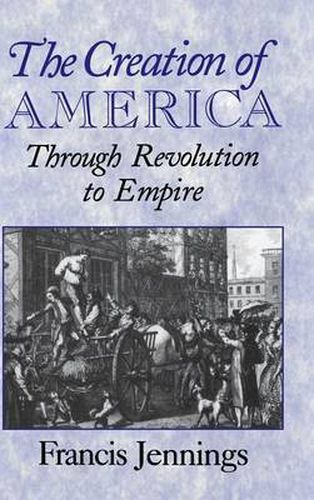Readings Newsletter
Become a Readings Member to make your shopping experience even easier.
Sign in or sign up for free!
You’re not far away from qualifying for FREE standard shipping within Australia
You’ve qualified for FREE standard shipping within Australia
The cart is loading…






In the standard presentation of the American Revolution, a ragtag assortment of revolutionaries, inspired by the ideals of liberty and justice, rise to throw off the yoke of the British empire and bring democracy to the New World. It makes a pretty story. Now, in place of this fairytale standing in for history, Francis Jennings presents a realistic alternative: a privileged elite, dreaming of empire, clone their own empire from the British. Jennings shows that colonies were extensions from Britain intended from the first to conquer American Indians. Though subordinate to the British crown, in the opposite direction they ruled over beaten native peoples. Adding to this dual nature, some colonists bought Africans as slaves and rigidly ruled over them within their colonies. To justify conquests and oppression, they invented the concept of racial gradation in a system of social castes. We live with it still. In this full scale reconception, the experience of tribal Indians and enslaved Blacks is brought into the whole picture. The colonists were enraged by efforts of crown and Parliament to forbid settlement in tribal territories. Especially Virginians rose under great speculator George Washington to seize the western lands in defiance of the crown’s orders. We witness the founders’ invasion and attempted conquest of Canada and the conquest of Pennsylvania as Quakers and German pietists were deprived of citizenship rights and despoiled of property through armed force and legal trickery. British sympathies were so strong that George III had to hire Hessians as soldiers because he could not trust his own people. And Britain also had movements for reform that won freedom of the press and refusal to legislate slavery while the Revolutionaries tarred and feathered their opponents and strengthened the slavery institution. Revolutionary rhetoric about liberty and virtue is revealed as war propaganda. Illegal committees and conventions functioned like soviets of the later Russian revolution. The U.S. Constitution was the fulfillment of the Revolution rather than its Thermidor.
The work is meticulously documented and detailed. By including the whole population in its history, Jennings provides an eloquent explanation for a host of anomalies, ambiguities, and iniquities that have followed in the Revolution’s wake.
$9.00 standard shipping within Australia
FREE standard shipping within Australia for orders over $100.00
Express & International shipping calculated at checkout
In the standard presentation of the American Revolution, a ragtag assortment of revolutionaries, inspired by the ideals of liberty and justice, rise to throw off the yoke of the British empire and bring democracy to the New World. It makes a pretty story. Now, in place of this fairytale standing in for history, Francis Jennings presents a realistic alternative: a privileged elite, dreaming of empire, clone their own empire from the British. Jennings shows that colonies were extensions from Britain intended from the first to conquer American Indians. Though subordinate to the British crown, in the opposite direction they ruled over beaten native peoples. Adding to this dual nature, some colonists bought Africans as slaves and rigidly ruled over them within their colonies. To justify conquests and oppression, they invented the concept of racial gradation in a system of social castes. We live with it still. In this full scale reconception, the experience of tribal Indians and enslaved Blacks is brought into the whole picture. The colonists were enraged by efforts of crown and Parliament to forbid settlement in tribal territories. Especially Virginians rose under great speculator George Washington to seize the western lands in defiance of the crown’s orders. We witness the founders’ invasion and attempted conquest of Canada and the conquest of Pennsylvania as Quakers and German pietists were deprived of citizenship rights and despoiled of property through armed force and legal trickery. British sympathies were so strong that George III had to hire Hessians as soldiers because he could not trust his own people. And Britain also had movements for reform that won freedom of the press and refusal to legislate slavery while the Revolutionaries tarred and feathered their opponents and strengthened the slavery institution. Revolutionary rhetoric about liberty and virtue is revealed as war propaganda. Illegal committees and conventions functioned like soviets of the later Russian revolution. The U.S. Constitution was the fulfillment of the Revolution rather than its Thermidor.
The work is meticulously documented and detailed. By including the whole population in its history, Jennings provides an eloquent explanation for a host of anomalies, ambiguities, and iniquities that have followed in the Revolution’s wake.